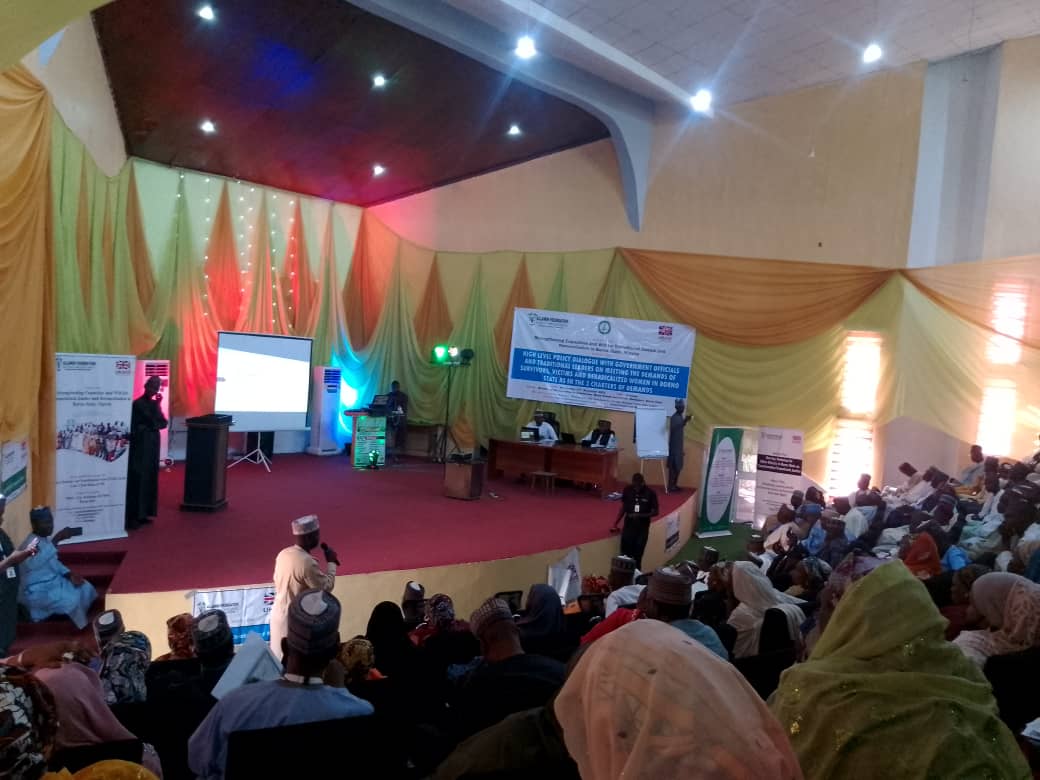BY FAIZA JIBRIN
A high-level policy dialogue titled 'Strengthening Capacities and Structures for Transitional Justice and Reconciliation in Borno State' was convened by the Alamin Foundation in collaboration with various stakeholders.
The event which was held at Musa Usman Secretariat Maiduguri, brought together government officials, traditional leaders, and community representatives to address the pressing demands of survivors, victims, and deradicalized women in Borno State.
The discussions centered on advancing reconciliation, transitional justice, and the socio-economic reintegration of those affected by insurgency.
The initiative, supported by the UK Government through its UK Aid program, forms part of a broader strategy to promote peace and social cohesion in the post-insurgency era.
In her remarks, Borno State's Commissioner for Women Affairs and Social Development, Haj. Zuwaira Gambo, highlighted the state's efforts in supporting over 3,000 children and adolescent girls caught in the aftermath of the insurgency.
'When we talk about children, we include adolescent girls who are neither women nor children; they are caught in between.
'They have returned as victims, but we cannot, we should not stigmatize them because they are our children. If we do not accept them, we risk breeding another cycle of challenges,' she said.
She stressed the importance of continuous social and mental health support for survivors, particularly women and children, to ensure their successful reintegration into communities.
'At the end of this dialogue, we want our traditional rulers, especially, to understand the need to accept these people, especially the women and children who are themselves victims,' she added.
The Executive Director of the Alamin Foundation, Hajiya Hamsatu Allamin, emphasized the need to focus on 'invisible children' and their mothers who face unique challenges in the aftermath of insurgency.
'With the support of the Borno State Government and the UK Government, we see the need to hold a policy dialogue so that all sectors of society can sit together to address the issue of invisible children and their mothers.
'We can now understand their fears, concerns, and needs, then look for solutions and cater to the needs of these children.
'The government has done a lot, so now it’s the turn of the people of Borno State, as individuals, organizations, and communities, to come up with what we can do. This will guide the government in responding effectively to each person’s needs,' she said.
While in his remarks, a community leader, Engr. Mohammad Abba Sanda also highlighted the resilience of survivors and their efforts to overcome stigmatization.
'Through their determination, they have expressed their journey of healing and reintegration in meaningful ways. These efforts deserve recognition and support as they contribute significantly to their ability to live without the burden of stigmatization,' he said.
Participants explored practical steps to implement sustainable solutions for survivors, emphasizing cultural sensitivity and grassroots involvement.
Discussions also addressed charters of demands presented by victims and survivors, which aim to shape policies that ensure justice, recovery, and long-term inclusion.
The Alamin Foundation reaffirmed its commitment to empowering affected women and communities. It called for sustained collaboration among stakeholders to build a foundation for lasting peace in Borno State.
This policy dialogue marks another step in the ongoing efforts to address the socio-economic and psychological needs of survivors while fostering community reconciliation.

